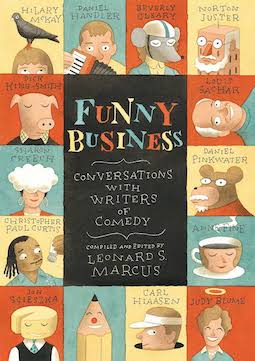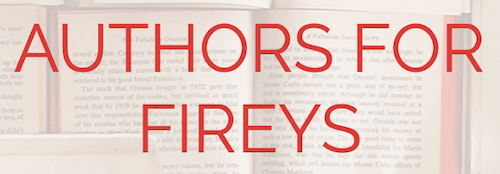 “A joke isn’t a joke if you need to explain it,” says Leonard S. Marcus, who compiled and edited this series of interviews with authors of funny books for children. “Even so, the hidden clockwork of comedy has long been considered one of the great riddles of life.”
“A joke isn’t a joke if you need to explain it,” says Leonard S. Marcus, who compiled and edited this series of interviews with authors of funny books for children. “Even so, the hidden clockwork of comedy has long been considered one of the great riddles of life.”
When the world is literally on fire, being able to have a laugh now and then may be the only thing stopping us from succumbing to utter despair. I like reading funny books. In fact, all of my favourite books include some form of humour, however dry or subtle it might be. And while I don’t write comedies, my books do have amusing bits in them (or at least, I find them amusing). So I picked up this book at the library, eager to learn more about why and how humour works in books.
Funny Business: Conversations with Writers of Comedy includes authors whose work I love and find hilarious (Beverly Cleary, Carl Hiaasen, Hilary McKay, Judy Blume), authors I don’t find funny at all (Daniel Handler/Lemony Snicket, Anne Fine), authors I’ve never heard of (Christopher Paul Curtis, Daniel Pinkwater) and authors I’ve heard of but haven’t gotten around to reading yet (Sharon Creech, Norton Juster). They discuss their childhood experiences with books and writing and comedy, how they write, and what they think about humour in their work and lives.
I was surprised at how many of these authors don’t plan their books before they start writing (or who claim they don’t plan), although nearly all of them discuss how much revision they do and how important reading is for writers. While there isn’t much about the “clockwork” of constructing a joke, there are lots of interesting insights into comedy. Sharon Creech, who has lived in America and Europe, thinks that the need for humour and the impulse to use it is “universal”, but feels that different nationalities have different senses of what is funny (“some being more wry or more subtle or pun-based, for instance”). I think this is true. Australian and British humour is often more self-deprecating than American humour, in my experience. I had an American editor ask me to change a bit in the first Montmaray book, in which my heroine was making fun of herself, because the editor felt this was a sign of low self-esteem and was sad rather than funny. (I also recall another American copy-editor who failed to see any humour in my joke about ‘were-chickens’ during a full moon and who thought that ‘Goat Husbandry for Pleasure and Profit’ was a real book — although that could be an individual-sense-of-humour thing and not an American thing.)
Sharon Creech agrees with Mark Twain about a link between humour and sadness, that humour is stronger when “juxtaposed with sorrow”. Along similar lines, Carl Hiaasen thinks that “even though my books are supposed to make people laugh, they’re serious books”. Meanwhile, Jon Scieszka is convinced that there is “boy humour” and “girl humour”, with broad, slapstick comedy appealing only to boys. Really? (Mind you, Scieszka has five brothers and no sisters and spent all his high school years at a boys-only military academy, so it’s not surprising that he doesn’t know what makes girls laugh.) Hilary McKay, like many of the authors interviewed, isn’t exactly sure why her work is funny, but says, “I think if you listen to what people say, exactly as they say it, and write it down, it’s pretty nearly always funny”, especially when it’s children, who are “fairly blunt and fairly direct”.
There’s also lots of general writing advice, ranging from the useless (you must get up at dawn to write for five hours straight, every day of the year, et cetera) to the sensible (read a lot). Carl Hiaasen is full of praise for some of his English teachers but says:
“Teachers can’t give you a voice, and they can’t give you a reason to write. That’s got to come from inside. And you’ve got to become your own toughest critic: brutal, persistent, never satisfied. That’s the only way to get better. You have to have some sort of fire burning inside … There are not a lot of blissfully happy serious novelists.”
Hilary McKay thinks that studying science and working in a chemistry lab helped her writing because she had experience at meeting deadlines and “noticing details”, while Louis Sachar, who loved maths, especially algebra, at school, says his books are “more math- or logic-based than most writing.”
This book includes photos of the authors as adults and children, examples of revised manuscript pages and correspondence with their editors, suggested reading lists of each author’s work and a handy index. There are no Australian writers, either because Leonard Marcus hasn’t read any or because he doesn’t find them funny. (Obviously, Australian writers are hilarious.) I found this book an enjoyable and fascinating read.





 “A joke isn’t a joke if you need to explain it,” says Leonard S. Marcus, who compiled and edited this series of interviews with authors of funny books for children. “Even so, the hidden clockwork of comedy has long been considered one of the great riddles of life.”
“A joke isn’t a joke if you need to explain it,” says Leonard S. Marcus, who compiled and edited this series of interviews with authors of funny books for children. “Even so, the hidden clockwork of comedy has long been considered one of the great riddles of life.” 

